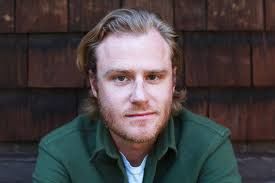My nail cuts through the peel, sends a burst
of oily mist through the sun splayed over
my aisle seat. The droplets move
in tandem, refracting the light,
and with the mist come bright citrus notes
that rapidly disperse into the olfactory systems
of surrounding passengers, interrupting their thoughts,
stirring awake the man in front of me
who hours ago told his seatmate I’m taking
a little Valium. If you need to pee, climb over me.
He shivers, rubs his eyes. We speed into a knot
of clouds and before we’re through he’s asleep again.
Chipped ice sweating onto napkins mapped
with the country. An already-completed
crossword in the seatback. A game
I play with myself is to see how long
I can keep the peel as a single coil, its carpeted
underside, its surface pocked like a teenage face.
Each tear releases more droplets I admire
for how they seem to assemble and swell,
a plume that breaks apart with a kind
of intention, a mission, how I imagine chemicals
to operate in a medical context, dispatched into systems
of cells, trained to obliterate, defend, convert.
Depending on the light, some reach an almost
amber tone while others bleach to yellow
as if administered different dyes
like the slides of deformed cells
I studied three nights ago
while googling the specifics of my father’s
leukemia, a browser window opened
onto paragraphs describing how
it’s most common among California migrant workers
and those exposed to Agent Orange in Vietnam.
And yet my father stayed out of the war.
Another page showed photos of drum barrels
stacked in rows, each one painted with
a stripe of orange from which the Agent
gets its name. There’s also an Agent
Pink, Purple, Green, Blue, White, called
Rainbow Herbicides. Because nothing
is too benign to be excluded from tactical use.
I see maps of dioxin production
include a plant in Newark, New Jersey
where a few miles inland my father as a boy
stood at his front door and watched
his father waking up hungover in the front seat
of his Ford where he passed out again
after a night at the VFW, a memory
inherited so long ago I can’t remember
when he told me, or if he even did,
and yet it matures in shapes and textures,
the color of the car, the dewed grass shining,
high broken ceiling and easterly winds
blowing over from Newark.
I remember watching the war in black and white
in someone’s living room, then in color,
my father said once. I searched for images
of scorched bone marrow and my wife
demanded I come to bed. I eat the orange
wedge by wedge, the pods exploding
between my teeth; wipe my fingers
on the seat cushion. I look up and see
on a seatback TV a few rows down
an aged Marlon Brando
as an even older Vito Corleone—
squirrel-cheeked, sitting among the tomatoes—
slide an orange peel over his teeth
and smile at his grandson who screams
and cries. He removes the peel,
laughs, the boy laughs, chases Vito through
the stakes, trying to spray him with a canister
of chemicals that mist over the family’s
San Marzanos, then Vito coughs, staggers
through a pirouette, and collapses.
The boy thinks this, too, is a joke, stands
over the corpse, soaking its shirt with chemicals.
The cabin jerks. The seatbelt sign dings on.
A child behind me coughs. I hold my breath,
flash through panic fantasies of carrying my father’s
death to him. In my head I hear the sentences
that describe how possible side effects
and genetic mutations can be passed down
to the exposed’s offspring.
I read them once, then again, then couldn’t stop,
wondering if I had just been introduced
to my death through reading, that it’s already
in me, a blip on the end of an x-axis
just waiting for the data to catch up to it,
something I can google, read its Wikipedia page,
my death as a searchable item, my death inherited,
manufactured by the war, my death
the result of my country, already fraying
the edges of my cells, a future blankness
detected by scans, the war passed down,
the war inside of me. I stare down at the bare
wintered woods of the Alleghenies blurring past
and wonder if all the acres decimated
by the rainbow look like that, but all the time.
Rolling hills of brown trees give way to sprawl.
Pre-fabricated homes. Cul-de-sacs.
The oils moved like angelic flame,
the scent with incredible speed. I imagine
the phantom waves of messages I can’t yet read
rising to my phone that say
we’ve been discharged and are heading home.
call us when you land. My father
shivering in the passenger seat.
Extreme nausea and aches, fatigue and low
spirits. I hand the peel to the flight attendant.
Gray flaps of wing metal rise and adjust,
a slight shift of the plane’s axis.
My tray table is in the locked and upright
position. My seatbelt is low and tight
across my lap. I look down once more
at the mountainous dirt I call home,
then return to my book about the assassination.
